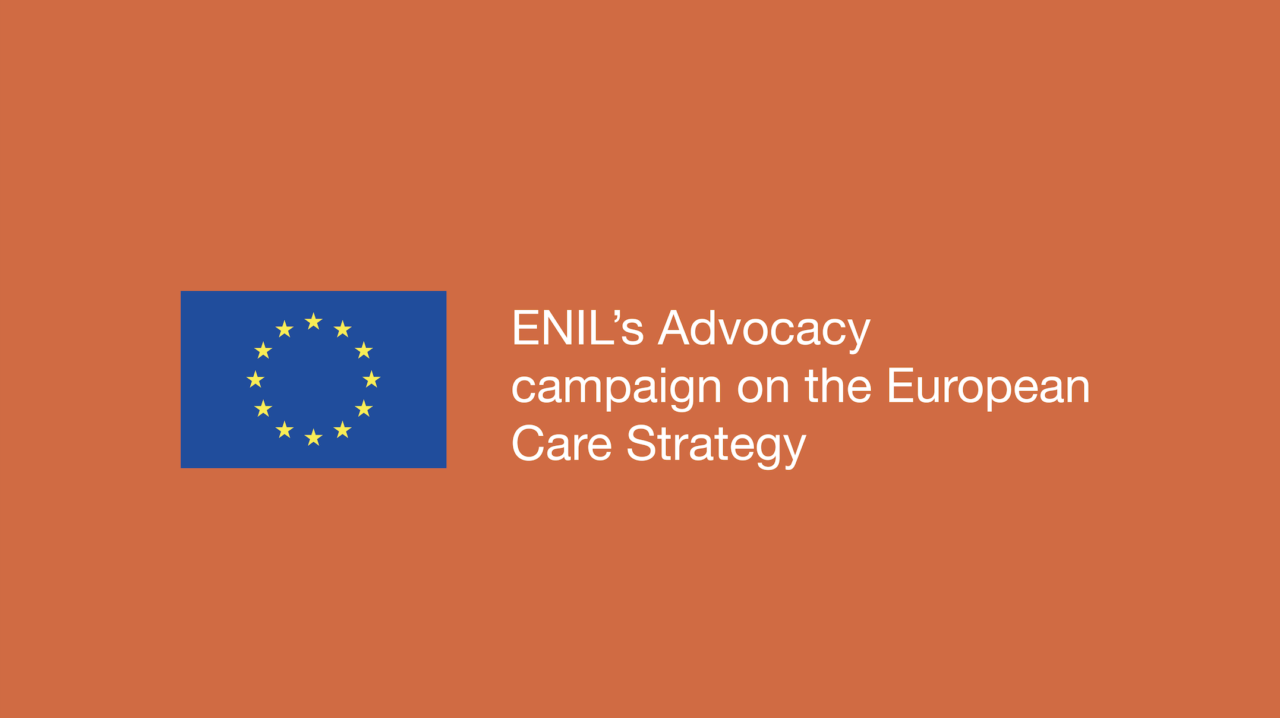The ENIL´s lobby campaign for a European Care Strategy that advances daisability rights has ended. Time to recapitulate the course of events and take stock of the results.
Florian Sanden, Policy Coordinator, florian.sanden@enil.eu
1. Publication by the European Commission
On September 7 the European Commission published the European Care Strategy. The key deliverables consisted of two proposals for recommendations by the Council of the EU: a. A recommendation on Early Childhood Education and Care and b. a recommendation on long-term care.
2. Our Statement
On September 20 ENIL issued a statement in response to the Commission proposal, focusing mostly on the proposal for a recommendation on long-term care.
For ENIL the long-term care recommendation was fraught with concern. In our statement we criticised:
- Treating disability as a subtopic of long-term care: The authoritative documents adopted by the CRPD and the special rapporteur state that disabled people have a right to support services which are to operate fundamentally different than services for long-term care.
- No commitment to personal assistance as a key disability support service: The Care Strategy mentioned personal assistance without explaining what it is about, nor saying what its role should be in service provision. General Comment no 5 and the Guidelines on DI clearly state that personal assistance is the first among various disability support services. User experiences and research show that personal assistance is key to independent living. To achieve DI, PA schemes must be developed as the major alternative to institutional settings.
- No commitment to deinstitutionalisation and the redirection of funding: The long-term care recommendation mentions residential facilities as a traditional form of care for older and disabled people. The UNCRP, General Comment no 5 and the Guidelines on DI commit state parties to end institutional settings.
We asked for example for these changes:
- Introducing a clear distinction between long-term care and disability support services.
- Introducing a strong commitment to PA
- Introducing a strong commitment to DI and the redirection of funding.
Our statement was send to over 200 contacts with the EU Institutions, NGOs, the media and also distribution among the ENIL membership. Disability activists in Austria helped to spread out statement.
3. Letters to State Governments
- Due to the risk of authorities using the long-term care recommendation as a justification to delay DI, ENIL began on October 18 to send letters to member state governments. Governments were selected based on where at least one of our national members wanted to support us. 11 national governments received letters. In our letters we asked to introduce the changes to the Care Strategy outlined before. The letters were accompanied by detailed amendments.
- To explain our position to the policy community an article was published in Social Europe: https://www.socialeurope.eu/does-the-european-care-strategy-care-about-disability
4. Meeting of the Disability Platform
- On October 25 a meeting of the disability platform, including an exchange of opinion on the European Care Strategy, takes place. The disability platform is an expert group in which the European Commission, member state authorities and civil society organisations discuss EU disability policy.
- The meeting offers ENIL an opportunity to ask critical questions on the European Care Strategy. The meeting minutes read as follows:
- “Mr Florian Sanden (ENIL) expressed his concerns over disability being treated as a sub-topic in long-term care. Persons with disabilities need support rather than passive care acceptance. The Convention aims to achieve the opposite, i.e. to decrease the dependence on medical professionals. Moreover, the Strategy speaks about residential care. Ms Dana Bachmann pointed out that there is a certain overlap between persons in long-term care and persons with disabilities, which is acknowledged in the Communication. Both the Communication and the proposal for a Council Recommendation make multiple references to independent living and the freedom to choose from different settings.”
5. Meeting of the Civil Society Coalition on long-term Care
On October 28 the Civil Society Coalition on long-term care bringing together organisations such as Age Platform, Eurocarers and the European Public Services Union (EPSU) met to discuss the European Care Strategy. Or policy coordinator clearly voiced ENIL´s position. It became clear that no other organisation shared our concerns.
6. Statement of the European Expert Group on the Transition from Institutional to Community-based Care
On November 17 the EEG published a statement on the care strategy. ENIL was able to successfully shape the statement. Almost all the points the statement made are in line with our position:
- The Care Strategy should clearly highlight the need for DI.
- The Care Strategy should clarify that support service have to be bound to the personal choice of users.
- Organisations representing disabled people should have had a stronger role in designing the Care Strategy.
- In the event of discrepancies, the European Disability Strategy takes precedence.
ENIL successfully advocated for a mentioning of the recommendation on early childhood education and care. Contrary to the long-term care recommendation, the early childhood recommendation unequivocally embraces the inclusion of disabled children into mainstream education. It is important not to omit praising when it is due. Since we did not have a chance to highlight this in our own statement, ENIL tried and succeeded in having some praise included in the EEG statement.
7. Launch of the UN Guidelines on Deinstitutionalisation, including in emergencies
On 9 September 2022, the Committee on the Rights of Persons with Disabilities (CRPD) of the United Nations adopted the Guidelines on deinstitutionalisation, including in emergencies. On December 1 the UN OHCHR Regional Office in Brussels and the European Network on Independent Living – ENIL officially launched the new Guidelines in the presence of key EU stakeholders, such as Ms Katarina Ivankovic-Knezevic, Director on Social Rights and Inclusion at DG Employment of the European Commission. During the meeting the policy coordinator had the chance to ask director Ivankovic-Knezevic how the Commission would remove the passages in violation of the UNCRPD from the recommendation on long-term care and if not how it would justify the adoption of such a policy initiative in light of the upcoming review in front of the CPRD. Director Ivankovic-Knezevic insisted that then entire Care Strategy was in line with the UNCRPD.
8. Adoption of the Council recommendations
- Shortly before the final vote by the European Council on December 8, we launched a last call to national governments to insert the necessary changes into the recommendation on long-term care. The call was published through the ENIL website and also sent to 168 contacts at civil society organisations and 55 contacts at media outlets.
- On December 8 the Council of the EU adopted both Council recommendations, without major modifications. The adoption of the recommendation on early childhood education and care can be seen as a success for the rights of disabled people. The adoption of the recommendation on long-term care is problematic. The Council of the EU removed a highly problematic sentence from the text that would have embraced group homes. Due to our letter campaign, we established contact with the Maltese Commissioner for Inclusion who helped us contact the Maltese government, triggering a reply from the minister for persons with disabilities. In addition, the governments of Germany and the Czech Republic sent us replies. All governments explained that, unfortunately, the texts had to be adopted without major changes.
9. Next steps
- On January 11 Nadia Hadad, accompanied by Florian Sanden attended a debate on the European Care Strategy at the Section for Employment, Social Affairs and Citizenship (SOC) of the European Economic and Social Committee. In her panel contribution Nadia highlighted the need to move ahead with the process of deinstitutionalization and the expansion of community-based services. Other speakers highlighted the importance of the European Care Strategy. Some speakers floated the idea to introduce a European Care Guarantee and a European Care Certificate.
- On January 31, the policy coordinator attended an event of the European Federation for Family Employment and Home Care during which high-level figures such as Vice-President of the European Parliament Marc Angel (S&D) praised the Care Strategy as an important policy for disabled people. The idea to present further policy proposals along the same lines such as a Care Guarantee and a Care Certificate were voiced several times, for example by Dana-Carmen Bachmann, Head of Unit Social Protection, EMPL D 2, European Commission. Work on the Care Strategy will continue.
- During December, the policy coordinator wrote a research article which serves as a contribution to a book on the European Care Strategy by the Foundation of European Progressive Studies (FEPS). The FEPS will publish its publication between March 6 and March 10.



